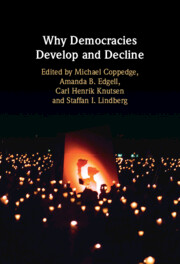Book contents
- Why Democracies Develop and Decline
- Why Democracies Develop and Decline
- Copyright page
- Contents
- Figures
- Tables
- Tables in Appendices
- Acknowledgements
- 1 V-Dem Reconsiders Democratization
- 2 The Ups and Downs of Democracy, 1789–2018
- 3 Long-Run Factors
- 4 International Influence
- 5 Economic Determinants
- 6 Political Institutions and Democracy
- 7 Democracy and Social Forces
- 8 Causal Sequences in Long-Term Democratic Development and Decline
- Appendices
- Bibliography
5 - Economic Determinants
Published online by Cambridge University Press: 28 June 2022
- Why Democracies Develop and Decline
- Why Democracies Develop and Decline
- Copyright page
- Contents
- Figures
- Tables
- Tables in Appendices
- Acknowledgements
- 1 V-Dem Reconsiders Democratization
- 2 The Ups and Downs of Democracy, 1789–2018
- 3 Long-Run Factors
- 4 International Influence
- 5 Economic Determinants
- 6 Political Institutions and Democracy
- 7 Democracy and Social Forces
- 8 Causal Sequences in Long-Term Democratic Development and Decline
- Appendices
- Bibliography
Summary
Several prominent debates on causes of democratization or democratic decline, concern different features of the economy. Yet, many of these debates lack in robust, conclusive evidence. We revisit the links between various economic factors and (electoral) democracy, drawing on global data extending from 1789 to 2018. First, we consider how economic development influences democracy, and democratic upturns and downturns more specifically. Second, we consider structural features of the economy related to types of production and assets as potential determinants of democracy. Third, we assess indicators of short-term economic performance. Fourth, we consider different economic inequalities. Our analysis shows several null-results or non-robust results, for instance, between income inequality and democracy (both upturns and downturns), or between (various aspects of) economic development and democratic upturns. We also find several robust relationships. For example, a high share of agricultural production in the economy mitigates democratization, whereas strong short-term economic performance and high income levels hinders democratic decline.
Keywords
- Type
- Chapter
- Information
- Why Democracies Develop and Decline , pp. 119 - 160Publisher: Cambridge University PressPrint publication year: 2022
- 2
- Cited by



